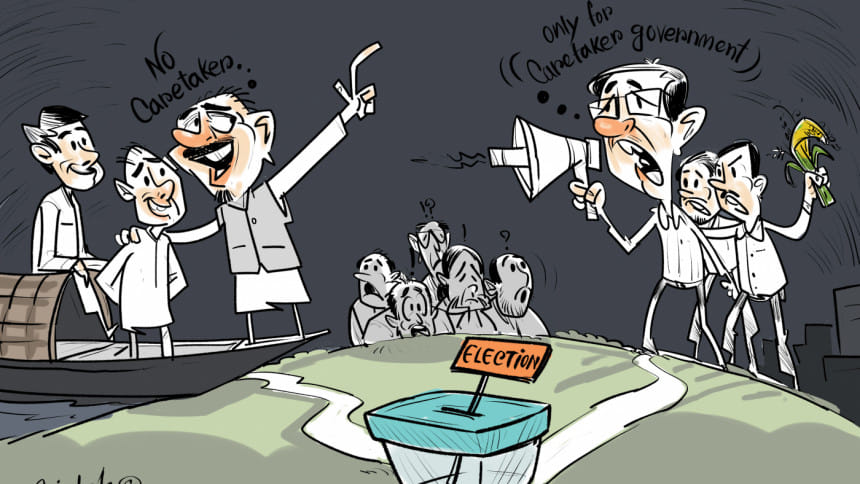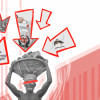AL-BNP faceoff: The endgame begins

On December 10 last year, the BNP was denied permission to hold its rally in front of its Nayapaltan headquarters at the heart of the capital. The rally in Dhaka – which was a culmination of similar gatherings in divisional headquarters that drew increasingly larger and noisier crowds – was expected to rise to a crescendo. The Dhaka Metropolitan Police told the party that it could not hold a rally on the streets but only on "open grounds". Miffed, the BNP leaders held a number of meetings with police but still could not get the permission. In the process, however, several leaders landed in jail and BNP had to settle for the Golapbag field, which had been suggested to begin with.
About seven months on, the same BNP was allowed to hold a rally, almost as big, in front of its office, at the very same spot. Last year, it was a Saturday. But this time, it was a weekday. Not only the BNP, but the ruling Awami League also held a rally blocking the streets in the Baitul Mukarram area, about a 10-minute walk from where the BNP had gathered. So, what prompted police to allow both parties to hold rallies on the streets this time? Many political commentators would point to the new US visa policy for paving the way for the opposition to take to the streets.
Guessing aside, why did the BNP choose to hold this rally now? The party announced on July 9 that it would hold a sizeable rally in front of its party office to formally announce its one-point demand. It was widely reported in the media that the main opposition camp's decision coincided with the visits of the US and EU delegations. The party wanted to display its strength on the streets, as well as its popularity, through a mammoth gathering, which would presumably justify the demand for a non-partisan, election-time government. And BNP was actually successful in showing it had the numbers on the streets, despite some obstruction for activists on the way to the venue and suspended or limited internet access in the area. The opposition used this in its favour, too, saying that this move only demonstrated the attitude of the ruling party and further justified the BNP's demand. The party believes that this gathering will help them regain the momentum they had supposedly built up leading to, but lost after, December 10.
Both parties claimed to be representing the will of the people – which were completely contradictory to each other – just as the din of their supporters was drowning out such pronouncements. Surely, the people (as one population) could not desire opposite things at the same time, which only suggests that the two parties were once again passing off their partisan interests and agenda as the "people's will".
Now, looking at the ruling party's rally, it is quite in line with its practice of announcing a counter programme close to – if not at the same spot – where its arch-rival BNP is looking to gather. The practice has been in place since last year, when the BNP gatherings started to attract more and more people, supposedly to convince themselves and voters that Awami League is not leaving the field entirely free as a walkover for BNP. But this time, there was the added motivation of making it clear to the visiting foreign delegations that Awami League also boasted substantial support and had numbers on the streets to prove it. And that, they did.
Although both parties are typically at loggerheads in almost every issue, and their bitter rivalry often leads to violence over petty incidents, Wednesday saw no violence to speak of. Moreover, both parties spoke of the same issues, with a similar rhetoric adopting almost diametrically opposite positions regarding the national election.
While BNP announced for the umpteenth time that it would not take part in elections under the current government, the Awami League retorted, once again, that elections could only be held under it. Both parties claimed to be representing the will of the people – which were completely contradictory to each other – just as the din of their supporters was drowning out such pronouncements. Surely, the people (as one population) could not desire opposite things at the same time, which only suggests that the two parties were once again passing off their partisan interests and agenda as the "people's will". The people, for their part, must have deduced that if the parties remained rigid in their respective stances, the upcoming days will be challenging.
While both the parties said they had never "complained" to the foreigners and blamed each other for tarnishing the image of the country, it was evident that the whole point of holding the rallies was to play to the proverbial gallery, where a few foreigners were sitting for the day. It is all the more embarrassing and shameful for us, the voters, because we could not choose a leadership that would not bow down so easily to foreign interests. And the delegates surely saw two parties with immense potential, but without the ability to come together to a sensible agreement.
Shedding their usual role, BNP appears to have morphed into a typical opposition party that takes initiatives, while the Awami League has adopted a more reactive role, which is also uncharacteristic. It appears that the movement on the streets is decided upon by the BNP, while the Awami League is trying to devise a plan to counter BNP and is perhaps finding it a rather difficult process. It is quite curious that the ruling party, having entirely decimated the BNP as an opposition, is still feeling threatened by it. It may seem for now that BNP has the momentum and the streets. But the party should avoid being complacent, because the Awami League's prowess on the streets is of no match. BNP's spirit and resolve will be put to the test in the months to come. The endgame is only getting started.
Mohammad Al-Masum Molla is chief reporter at The Daily Star.

 For all latest news, follow The Daily Star's Google News channel.
For all latest news, follow The Daily Star's Google News channel. 










Comments